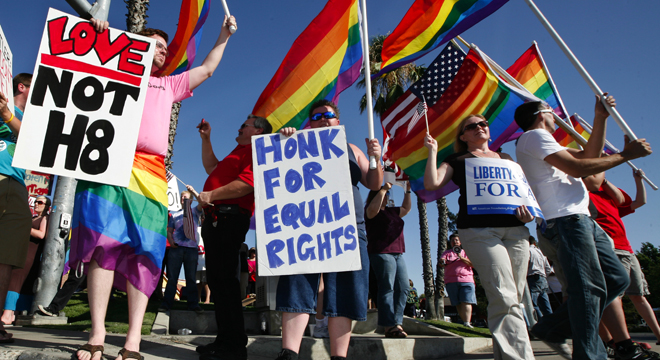A federal appeals court in California has upheld a lower court’s ruling that Proposition 8, the state’s ban on gay marriage, is unconstitutional, writing that the law “serves no purpose, and has no effect, other than to lessen the status and human dignity of gays and lesbians in California, and to officially reclassify their relationships and families as inferior to those of opposite-sex couples.”
In a 2-1 decision, a three-judge panel of the Ninth Circuit announced its long-awaited ruling that Prop 8, approved by voters in 2008, violates the Equal Protection Clause of the 14th Amendment.
Judge Stephen Reinhardt, in the court’s 128-page opinion, wrote that “although the Constitution permits communities to enact most laws they believe to be desirable, it requires that there be at least a legitimate reason for the passage of a law that treats different classes of people differently. There was no such reason that Proposition 8 could have been enacted.”
“All that Proposition 8 accomplished was to take away from same-sex couples the right to be granted marriage licenses and thus legally to use the designation of ‘marriage,’ which symbolizes state legitimization and societal recognition of their committed relationships,” Reinhardt wrote. “Proposition 8 serves no purpose, and has no effect, other than to lessen the status and human dignity of gays and lesbians in California, and to officially reclassify their relationships and families as inferior to those of opposite-sex couples. The Constitution simply does not allow for ‘laws of this sort.'”
The panel also rejected arguments by Prop 8 proponents that the purpose of the initiative was “to promote child rearing by biological parents, to encourage responsible procreation, to proceed with caution in social change, to protect religious liberty, or to control the education of schoolchildren.”
“Simply taking away the designation of ‘marriage,’ while leaving in place all the substantive rights and responsibilities of same-sex partners, did not do any of the things Proponents now suggest were its purposes,” the opinion says. “Proposition 8 ‘is so far removed from these particular justifications that we find it impossible to credit them.'”
“It is enough to say that Proposition 8 operates with no apparent purpose but to impost on gays and lesbians, through the public law, a majority’s private disapproval of them and their relationships, by taking away from them the official designation of ‘marriage,’ with its societally recognized status. Proposition 8 therefore violates the Equal Protection Clause,” Reinhardt wrote.
The panel also declined to rule on the broader question of whether any ban on gay marriage would be unconstitutional, which could have had implications in other states, “because California had already extended to committed same-sex couples both the incidents of marriage and the official designation of ‘marriage,’ and Proposition 8’s only effect was to take away that important and legally significant designation, while leaving in place all of its incidents.”
“This unique and strictly limited effect of Proposition 8 allows us to address the amendment’s constitutionality on narrow grounds,” Reinhardt wrote.
The decision upholds a 2010 ruling by U.S. District Court Judge Vaughn Walker, presiding over a challenge to the law by two gay couples and the American Foundation for Equal Rights, that the law was unconstitutional. Walker wrote that “Proposition 8 fails to advance any rational basis in singling out gay men and lesbians for denial of a marriage license.”
Supporters of the measure have argued that Judge Walker’s initial ruling should be vacated because Walker is gay, an argument that the Ninth Circuit rejected on Tuesday. Walker’s failure to disclose this at the outset of the trial, Prop 8 supporters had argued, went against “the judiciary’s strict fidelity to the ancient maxim that ‘no man can be a judge in his own case and no man is permitted to try cases where he has an interest in the outcome.'”
In his opinion, Reinhardt agreed with the California Supreme Court’s determination that supporters of the initiative have the standing to continue to bring forward legal challenges, but noted that “here, however, their defense fails on the merits.”
Supporters of Prop 8 now have the chance to petition for rehearing en banc — which, if granted, would mean an eleven-judge panel of the Ninth Circuit would hear the case — or to appeal straight to the Supreme Court. The Ninth Circuit can also vote to hear an en banc appeal either way.
Last week, the Ninth Circuit panel also ruled that the videos of the Prop 8 trial should remain sealed, which was pushed for by supporters of the initiative.
Prop 8 opponents are currently collecting signatures to get a measure on the November 2012 ballot that would ask voters to overturn the law.
Here’s the full opinion:






